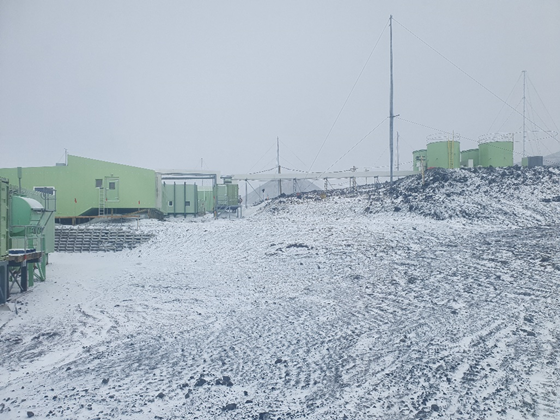Ross Island Wind Energy Network

Client: Antarctica New Zealand
Location: Ross Island, Antarctica
Date: January - December 2022
Feasibility, option studies and preliminary design for the redevelopment of Antarctica New Zealand's Ross Island Wind Energy Network hybrid system
Background
Antarctica New Zealand operates a wind-diesel hybrid energy system on Ross Island, Antarctica. The system supplies electric power to New Zealand’s Scott Base research facility as well as exporting to the United States’ McMurdo Station with the two systems (50 Hz and 60 Hz) being connected through a frequency converter. The existing three (3) 330 kW wind turbines have been successfully delivering renewable energy to Scott and McMurdo since they were installed in 2010.
Antarctica New Zealand identified a need to upgrade the current SCADA and hybrid control system as well as the flywheel-based grid support system (PowerStore) to increase reliability and maximise the amount of the wind generation that can be used by the system.
Antarctica New Zealand also plan to replace the wind turbines with additional capacity at the same time as a comprehensive redevelopment of Scott Base. For this stage, a very high quantum of renewable energy is targeted, and Entura was engaged to undertake the preliminary design and to assist with procuring the solution.
Solution
Entura was approached by Antarctica New Zealand based on our previous experience implementing hybrid energy systems in harsh and remote locations where reliability is critical.
For the immediate need, Entura developed solutions for upgrading the system to maintain reliability, including minimum cost, like-for-like, minor and major improvement options. The recommended solution (minor improvement) is to replace the aging flywheel and control system with a new 500 kW Battery Energy Storage System (BESS) and a modern Microgrid Control System (MCS) that will take over the roles of coordinating the diesels, wind turbines, frequency converter and BESS.
For the future replacement of the wind turbines, Entura worked closely with Antarctica New Zealand to deliver a detailed feasibility study, considering energy generation (wind, solar) and storage (BESS) options, logistics of delivering and erecting large wind turbines in Antarctica, scheduling, and detailed cost estimates. Preliminary electrical design was undertaken, and developing assistance provided.
Services provided
Hybrid system feasibility study including:
- concept design
- power system modelling
- energy modelling
- construction logistics
- scheduling
- cost estimates
- risk assessment
- design and procurement support
- wind farm noise, shadow flicker and electro-magnetic interference studies.
Outcome
For the Scott Base Redevelopment project’s implementation business case, Entura developed options of around 3-4 MW of wind energy and a BESS of up to 10 MWh capacity. An aspirational 100% renewable energy target for Scott Base is now looking feasible from a technical, environmental, and economic perspective. Entura has provided ongoing support to Antarctica New Zealand’s design and procurement for the SCADA and grid support upgrade project.




